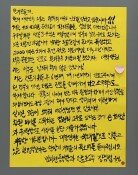Endless series of ordinances trouble teachers
Endless series of ordinances trouble teachers
Posted May. 10, 2013 05:33,
The Gyeonggi Provincial Office of Education announced on Feb. 27 this year an ordinance on the establishment and operation of parents association at schools to support parents school-related activities. The problem is, however, that neither schools nor parents do not know how the parents associations are different from the existing school steering committees. Instead, the ordinance has significantly increased work burdens on teachers.
The Gyeonggi Provincial Office of Education paid each parents association at every school in the province 500,000 won (461.25 U.S. dollars) to help cover operational expenses and additional funds of up to 2.5 million won (2,306 dollars) to 537 associations selected through a public contest. Some even suspect that the ordinance has been introduced with an eye to next years election for education superintendents.
The problem is not limited to the ordinance for parents associations. A series of other ordinances are confusing the education community. Some experts say that education ordinances, which are supposed to reflect schools voices and help teachers or parents, actually shackle teachers.
According to the Government Legislation Ministrys data obtained by the Dong-A Ilbo, a total of 845 education ordinances were proposed by local education superintendants or members of local councils and are now in effect. Among them, 657, or 77.8 percent, were proclaimed in 2010 or later. In 2010, education committee members belonging to independent provincial or municipal offices of education were incorporated into education committees of local councils, with their authorities significantly strengthened.
Such excessive issuance of education ordinances has eventually added burdens on schools. With increased administrative burdens, some schools had to put teachers exclusively in charge of dealing with ordinances. Especially, a series of politically motivated education ordinances have made the situation more difficult for schools. Such ordinances are concentrated in areas where six progressive and left-leaning education superintendents were elected in 2010.
Headline News
- Med professors announce intention to leave hospitals starting Thursday
- Bridge honoring Sgt. Moon Jae-sik unveiled in Pennsylvania
- Chief of Staff Chung tells presidential secretaries to stay away from politics
- US FTC bans noncompete agreements
- N. Korea launches cyberattacks on S. Korea's defense companies







